“It’s been a great meeting!
Community Network Meeting: 9th July 2024

39 members of the Community Network met in Weston at The Campus on Tuesday 9th July.
The morning began with coffee and time to catch up with those we hadn’t seen for a while, before settling down at 10am for a great line-up of speakers. We first heard an update from Dr Lucy Selman about what had been achieved since the network started and the aims of the new AHRC-funded Coastal Communities and Creative Health three year project.
The new project links Weston to a national partnership to tackle health inequalities in coastal communities. The Weston team is joining forces with teams in Hastings and Blackpool, with a combined focus on mental health inequalities in coastal towns in three priority areas: young people’s mental health and well-being, drug and alcohol misuse, and serious illness and bereavement.

We heard from two co-applicants, David Moss from the Weston and Woodspring Locality Partnership, who talked about priorities and goals of the partnership in the areas of young people’s mental health, substance misuse and end-of-life and bereavement services. David’s description of the ecosystem was a thread running throughout the next talk by Alison Bancroft from The Other Place, who talked about what is needed to collaborate in a complex world. Alison’s talk opened up discussion in the room about what compassionate collaboration would look like and what the network needs to achieve it.

We then heard stirring talks from those working in the new priority areas, substance misuse and young people’s mental health – Adrian Riley from With You, Bev G Star from Humans of Weston and Sophie Shepherd from Off The Record. Sue Stone from VANS shared updates about the North Somerset CYP Network and Wellbeing Fund, which will be distributing funds to the community sector.
The Q&A sessions after each speaker raised important points, with members sharing contacts and suggestions for how to overcome different types of barriers for organisations (e.g. accessing GP team meetings) and individuals accessing services (e.g. those in recovery feeling unable to access primary care). Weston Hospicecare invited network members to get involved in their new Advance Care Planning document – please contact Kyran Hawkes at the Hospice: kyran.hawkes@westonhospicecare.org.uk.
We ended the morning with small group discussions, exploring three questions on a tablesheet (see below). The ideas collected in the group work will inform the project going forward and will be shared with the network in due course.



After the event, some network members got in touch to say, “It was a fantastic event – so good to hear how people are working to support others.”
If you are a member of the public with lived experience in one of our priority focus areas, are from the health and social care sector or VCFSE sector or are an independent artist/creative, please email a.malpass@bristol.ac.uk to be added to the mailing list or for further information. If you would like to feed in ideas and suggestions in response to the questions on the worksheets on behalf of your organisation, network or community, please get in touch. Everyone’s views are welcome, and everyone is welcome to the next network meeting in January 2025! Date TBC, watch this space.
New national partnership to tackle health inequalities in coastal communities

Weston-super-Mare Community Network news update: April 2024
The Community Network is delighted to announce that our important collaborative work will continue as part of a national project focussed on mental health in coastal communities. The Weston-super-Mare Community Network for Health Inequities is joining community-led teams in two other coastal towns – Hastings and Blackpool – as part of a new £2.4 million project, funded by the Arts and Humanities Research Council (AHRC).
Our Community Network first came together in December 2022 at the Campus, Worle. Over 9 months the network grew in numbers and strength, making time for important face-to face cross-sector relationship building, alongside working hard over 9 months to deliver outputs to support better linkages across sectors in end-of-life care, bereavement support, social isolation and loss. Some of our achievements as a network include a data dashboard and directory of community resources, a digital map of community assets using Understory technology, facilitating training events, and hosting Good Grief Weston festival.
The new Partnership, titled ‘Coastal Community & Creative Health’, will extend the work of the Weston-super-Mare Community Network and build new connections with other coastal communities in Hastings and Blackpool who experience similar challenges in coastal community health. All three coastal communities have already been working with creative partners as one way to tackle health inequities and bring a wealth of experience and expertise to share.
Who is funding the new partnership?
The £2.4 million award is one of a number of partnerships being funded by UK Research and Innovation (UKRI) under the AHRC-led Mobilising Community Assets to Tackle Health Inequalities programme, which aims to improve health through access to culture, nature and community.
Who is leading the new partnership?
Lucy Selman and Barbara Mezes will co-lead the three-year national partnership, together with partners in each of the three coastal towns.
Dr Barbara Mezes, is Lecturer in Clinical Psychology at the Institute of Population Health, University of Liverpool, and Dr Lucy Selman, is Associate Professor from the Centre for Academic Primary Care and Palliative and End of Life Care Research Group at the University of Bristol and a Weston-super-Mare resident. They both separately led Stage 2 funded projects.
What’s new? Continuing to work with local partners but expanding our priority areas
The new project will continue to bring together the NHS, local authorities, researchers, voluntary and community organisations and residents to tackle health inequalities. However, the new partnership will focus in particular on three mental health priority areas in coastal towns:
- young people’s mental health,
- substance misuse,
- and life-limiting illness and bereavement
The Partnership will generate evidence and resources to improve mental health in these focus areas by enhancing and widening access to creative community assets; enhancing the skills and knowledge of people working with these communities; and creating a model of collaborative working across sectors and with community members, to help tackle health inequalities using creative community assets. Co-production with local people with lived experience will run throughout the project.
What people are saying about the new partnership:
Sue Stone, Research and Development Manager with Voluntary Action North Somerset, said, “As a partner in the original network, this programme has proved to be invaluable for our understanding of people’s needs around bereavement and providing essential support for our residents. We were pleased to be included in the successful joint bid and are now ready to see the new programme evolve, allowing us to share our learning experience and develop new ideas with our counterparts in Blackpool and Hastings, especially around children and young people’s mental health”.
Alison Bancroft, from The Other Place and Race Equality North Somerset (RENS) said, “Working with a partnership of community-led, front-line organisations that focus on issues of equality, we’re only too aware of the scale of need in our community – and the disparities that exist. There is an urgent need for cross-sector, multi-disciplinary projects such as this, which connect academic enquiry and lived experience, and we’re delighted that this project is continuing and expanding. We’re very grateful to all involved for the opportunity to participate and are very much looking forward to working with team members, particularly those from other coastal communities, to share experiences and build a deeper understanding of the issues involved”.
Fiona Matthews, Creative Director of Super Culture and a partner in the network since 2022 said, “We are honoured to be part of this new programme, which is a brilliant opportunity to build on the many creative and community-based connections that were sparked in 2023 through Weston’s inaugural Good Grief Weston Festival and the instigation of the community network.
“At Super Culture we are great believers in the transformative power of both creativity and community, and the additional national scope of this next phase presents exciting opportunities to test new ways of working and share experiences, skills and knowledge. It will also build a compelling evidence base for dynamic and interdisciplinary social models that can support better health outcomes.”
Dr Lucy Selman said: “Coastal communities suffer some of the worst health outcomes in the country, and significant inequities throughout the life course. We are delighted to collaborate with Dr Barbara Mezes and colleagues nationally to expand our work in serious illness and bereavement to benefit other coastal communities, and to widen our focus to include young people’s mental health and wellbeing and substance misuse – key areas of concern in our communities. We are hugely grateful to UKRI and the AHRC for supporting this project.”
Dr Barbara Mezes said: “I am excited to collaborate with Dr Selman and a very strong team, and grateful for the opportunity. Coastal communities face many challenges, including poverty, but they have many community assets, such as cultural organisations, community centres, and charities working tirelessly to support the wellbeing of local residents. This funding will allow us to work with community partners to better integrate creative community assets into health and social care systems by bolstering cross-sector local and national partnerships. We will generate the evidence base to inform local actions and a national strategy to tackle inequalities, address mental health needs, and improve the wellbeing of people living in our coastal communities.”
AHRC Health Inequalities Programme Director Helen Chatterjee said:
“These funded projects seek to improve the length and quality of our lives by making use of the rich cultural, artistic, nature and social resources that already exist within our communities. In this way, we can shape a healthier, happier Britain.”
Find out more
For a full list of funded projects, see: https://www.ukri.org/news/projects-to-help-communities-reduce-health-inequalities/.
Data dashboard now live!

The Network is delighted to launch a new data dashboard created during the project in collaboration with North Somerset Council and Weston Hospicecare. The dashboard provides open access to data collated from multiple sources including the Joint Strategic Needs Assessment, census data (2021), ONS death registrations, English indices of deprivation, Department of Work and Pension, school attendance and employment data and hospice data. We aimed to draw these data sources together to investigate local inequities in palliative and end-of-life care and bereavement support and provide an open-access resource which stakeholders can members of the public can use.
Also integrated within the dashboard is a database of support groups collated by Voluntary Action North Somerset. A pdf list featuring many of these resources is available to download from the Super Culture website.
On 5 October 2023 we held a webinar about the dashboard – you can watch it here.
Particular thanks to Donna Davies at North Somerset Council for driving forward this work.
Community Network Meetings
As part of the Network’s activities, we hold regular community meetings to which any interested stakeholders and community members are invited. These are brilliant opportunities to shape the Network’s plans and meet others interested in health inequities and supporting people in Weston-super-Mare. Our last meeting as part of the current AHRC-funded project was held on June 30th 2023 at the Campus and featured talks and discussions about all the activities we’ve been engaged in since November 2022 – see below for a visual illustration.
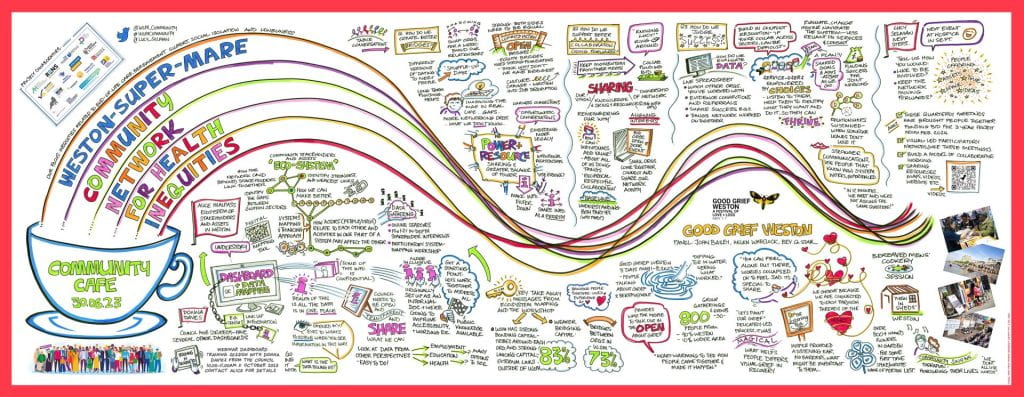
During the meeting everyone agreed that these get-togethers were so useful they need to continue despite the end of the grant! We were therefore delighted that Weston Hospicecare hosted our next Community Meeting in September. Join us on January 18th 2024 for the next one at the For All Healthy Living Centre – registration is open here. Lunch will be provided free of charge after the event, cooked by some of ‘The Bournville Squad Team’ using ingredients from the local allotments and Community Fridge – thank you to the Squad!
Good Grief Weston – the film!
From 1st to 8th May 2023, Good Grief Weston filled the seaside town of Weston-super-Mare with over thirty workshops, performances and grassroot community activities which aimed to open up conversations around death and bereavement.
We are delighted to launch two short films (7 mins and 3 mins) about the festival created by local filmmaker Paul Collins. The films feature snapshots of our diverse programme of events, including a variety of music performances, large scale community art project, poster campaign, and synchronised swimming extravaganza! We also hear from some of our contributors and participants, who reflect on their experiences of grief and what the festival meant to them.
Read more about the films on the Culture Weston website.
Good Grief Weston – Full Version from Culture Weston on Vimeo.
Good Grief Weston – Short Version from Culture Weston on Vimeo.
Remembrance field of Forget-Me-Nots at Grove Park
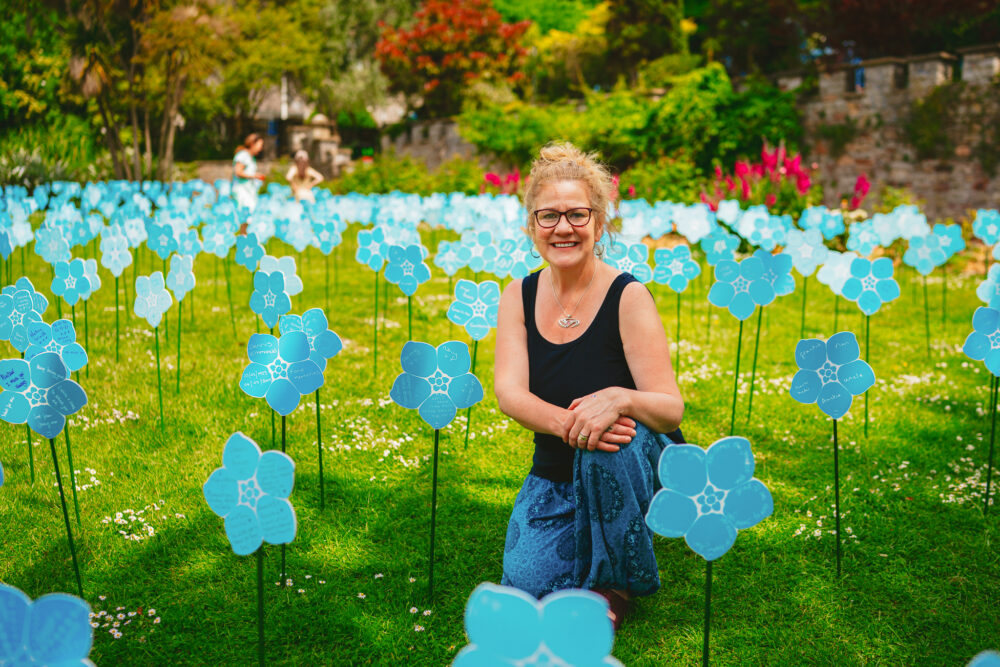
Visitors to Grove Park over the May Bank Holiday weekend enjoyed a poignant
display of more than 800 forget-me-not flowers created by members of the
community in tribute to those they have loved and lost.
The large-scale memorial art project, led by artist Helen Wheelock, featured a
meadow of forget-me-nots in vibrant shades of blue, screenprinted by artist Zara
Emily on plastic otherwise destined for landfill.
People were invited to wander around the installation which took place on Sunday
28th May and reflect upon the hundreds of heartfelt messages written or drawn on
each individual flower, including moving tributes to parents, grandparents, friends,
partners and pets. There was also an opportunity to create your own artwork and
plant a flower to add to the installation.
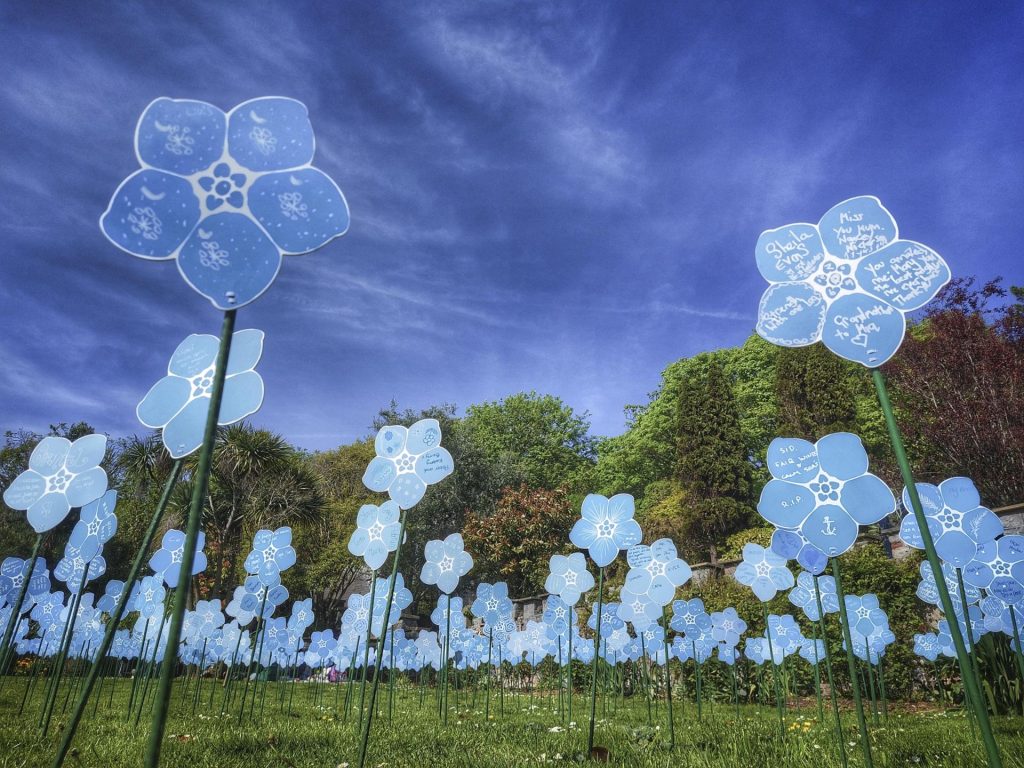
The flowers were created by people of all ages attending a host of artwork sessions
held in local hubs throughout the area, including For All Healthy Living Centre, North
Somerset Training Hub, Chocolate Garden, Weston Artspace, Substation Community
Hub and community spaces at Aller Parade and Loxton Road.
Helen Wheelock, Director of Create Together and Community Growth Manager at
Alliance Homes, said: “Forget-Me-Not has opened up so many personal
conversations for people around loss, providing a safe, creative space to talk about
their loved ones and grief. It has been a privilege to co-create the project with
communities in Weston and share it at Grove Park and we want to thank everyone
who contributed to the memorable artwork.
“As a direct result of this community activity, further initiatives including a Grief Café
and Bereaved Men’s Cookery group are being established, providing ongoing
opportunities in the local area.”
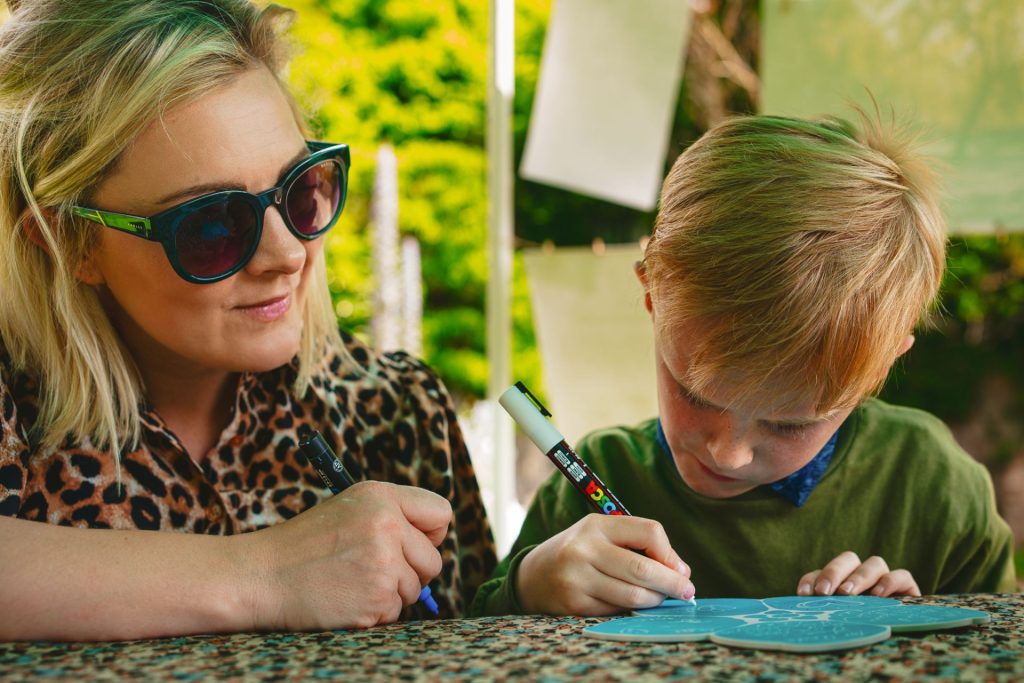
Photographs and stories paying tribute to people and places were on display in
‘Where We Walked’, a photographic project by Paul Blakemore and the local
community, supported by Alliance Homes. Through ‘Where We Walked’, six
residents of Weston revisited cherished places they have enjoyed with beloved ones
they have lost, with personal, photographic portraits of the landscapes created. In
addition, postcards have been produced that share these locations and sentiments
with the wider world, alongside signposts to local walking groups and support
services.
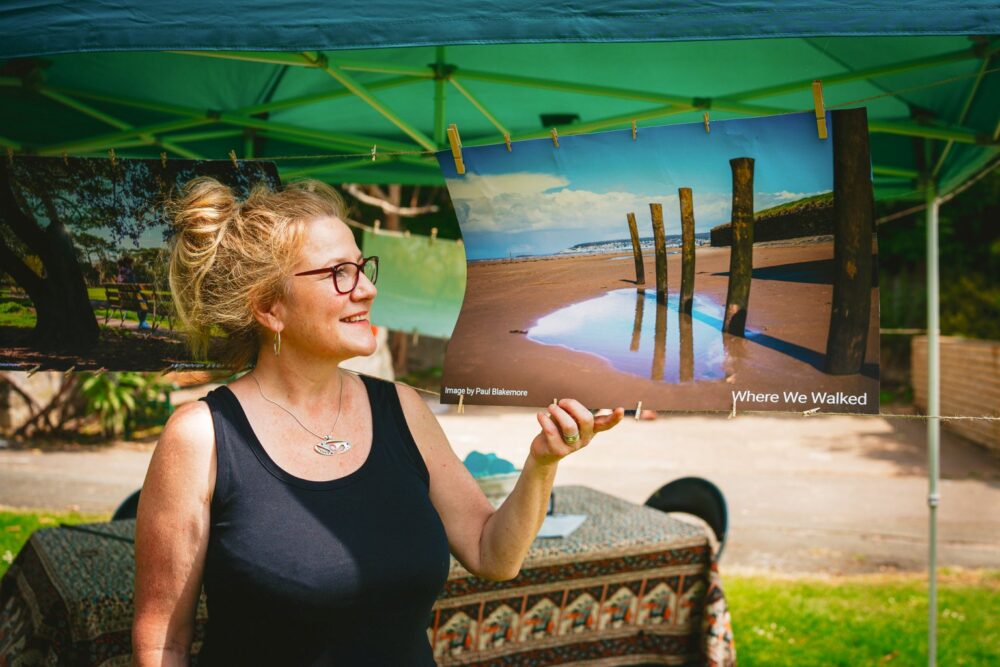
Weston Hospicecare and their volunteers also joined the Sunday event, bringing
along memorial daisies that decorated the Grove Park bandstand for people to
purchase on the day in aid of the charity.
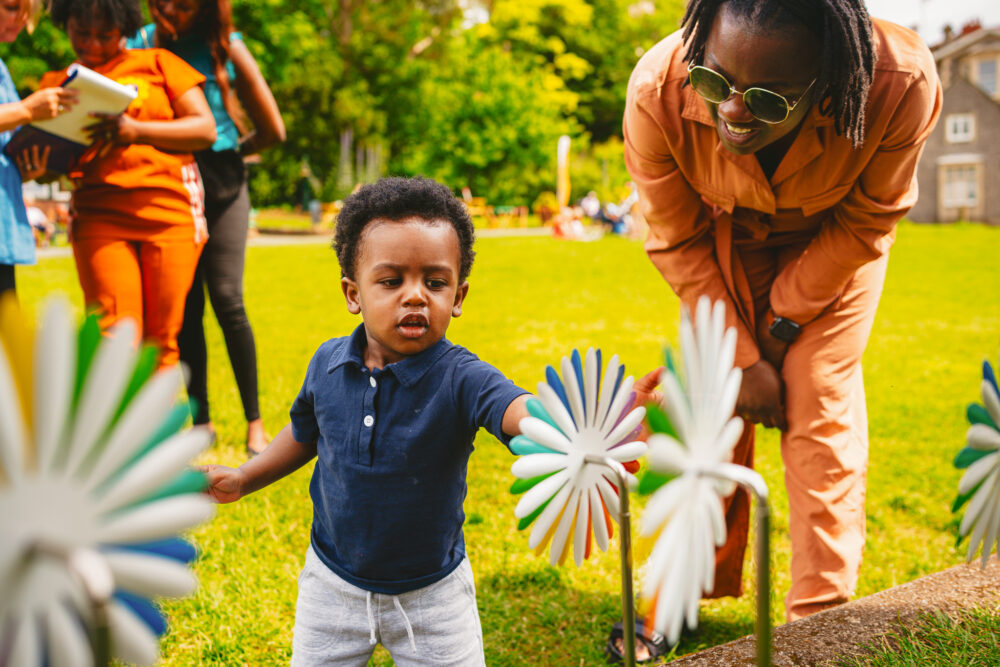
‘Forget-Me-Not’ and ‘Where We Walked’ are both part of the recent Good Grief
Weston Festival (1 – 8 May 2023), an inaugural event produced by Culture Weston in
collaboration with the University of Bristol and the Weston-super-Mare Community
Network.
Weston Hospicecare has been a key partner on Good Grief Weston, providing
counselling support at all of the events during the Festival and platforming groups
such as Men in Sheds, who meet year round to help people navigate bereavement.
For more information about Good Grief Weston 2023, visit
https://cultureweston.org.uk/projects/good-grief-weston/
Good Grief Weston: Closing ceremony
“Congratulations – such an amazing subversive thing to do in Weston” – Rupert Callender on the inaugural Good Grief Weston Festival, Weston-super-Mare (1-8 May 2023)
“It’s amazing that you are bringing your community together in this way.” – Freya Bromley, author of The Tidal Year
“A joy and a privilege to be part of such a caring and creative space.” – Bethany Roberts, Musician with House of Figs
“Well done again to Culture Weston for bringing something different to Weston – a great programme of events!” – Debbie Apted, local resident
“Such an honour to have been part of this incredible festival and to have been included in so many personal stories… I’m still in awe of everything I witnessed during the festival. It’s an absolute treasure!” – Nina Thomas-Bennett, Weston-based Community Artist
Good Grief Weston drew to an intimate close at Loves Cafe, after an 8-day festival on love and loss, which saw thousands of people come together in a specially curated array of inclusive activities and events that opened up compassionate conversations in the community around death and bereavement.
Capturing the essence and heart of the event, were the moving and poignant closing ceremony words from ‘punk undertaker’ and author Rupert Callender, founder of The Green Funeral Company and one of the country’s best-known, eco-friendly funeral directors.
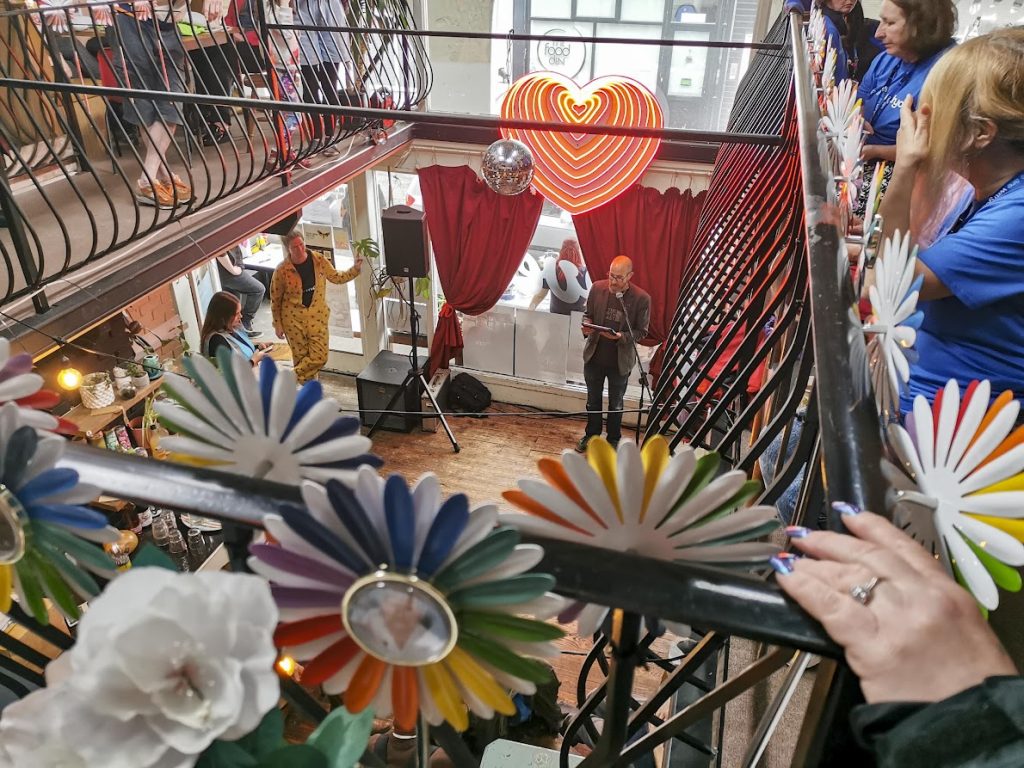
“There is of course only one way to end a festival like this, and that is by allowing ourselves to refocus one last time on grief itself, and the many ways it is in our lives.
There is no doubt that grief in its many forms is one of the hardest burdens we carry through life, but along with the weight of this, there is so much to be grateful for, so much grief has to teach us.
Without grief, there is no joy, no connection, no freedom from the isolation of our individuality. Without loss, we pass through life empty handed, not shedding but not receiving either.
We grieve, not just because we shed so much as we move through this life, but because we are connected to each other through threads of the heart. We are each other.
And as Jane Edmonds says in her book ‘When Words Are Not Enough’, grief is an act of rebellion in a numb world. It is radical to wear our pain, to refuse to hide our sorrow in a world that is tilted towards the denial of real emotions.
Let’s revel in our radicalism, our refusal to surrender to the consumerism of the soul, the shame that we feel at the exposure of our sadness. Let’s close the shameful distance we keep from our bereaved. Let’s pull their sadness into our arms.
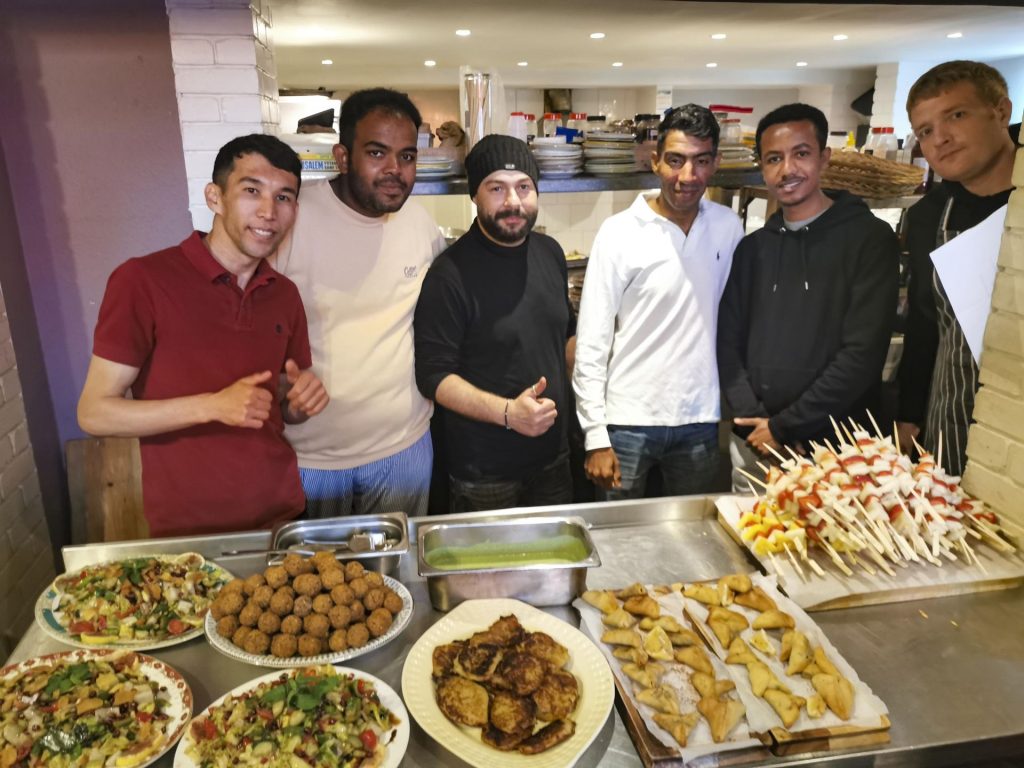
This week will no doubt have opened up some old shafts of grief for you, portals to loss, whether it is the loss of those we love who are no longer here, or wider losses – relationships, friendships, our health, a much loved pet, a job, a radical change of circumstance.
Life is strewn with loss, it is the inescapable price we pay for living.
And we have a choice today, after these old paths have been opened, after these wounds have been exposed to the light.
We can keep them open, hold on to those precious yet painful memories that have been awakened this week, remember our dead, grieve our losses, hold on to those important, devastating moments of our lives. Or you have the chance to gently close those portals again, to fold the pain away, but to keep the love with you, to move back into life holding all of our precious memories, our precious dead with us, as we move back into the stream of living, the flow of time which takes us to more love, more loss, more happiness more life in all of its glorious bloody glory.
Let’s hold our grief together.
Let us remember our personal losses, and the losses we have born as a country, and that includes the social losses we are suffering, the cracks between community and class that yawn wider every day. The loss of our cohesion, our path, ourselves.
But grief can weave us back together again. Grief can be a bridge between each other, between cultures, between us and our dead.
We will not forget them. We will not be forgotten.
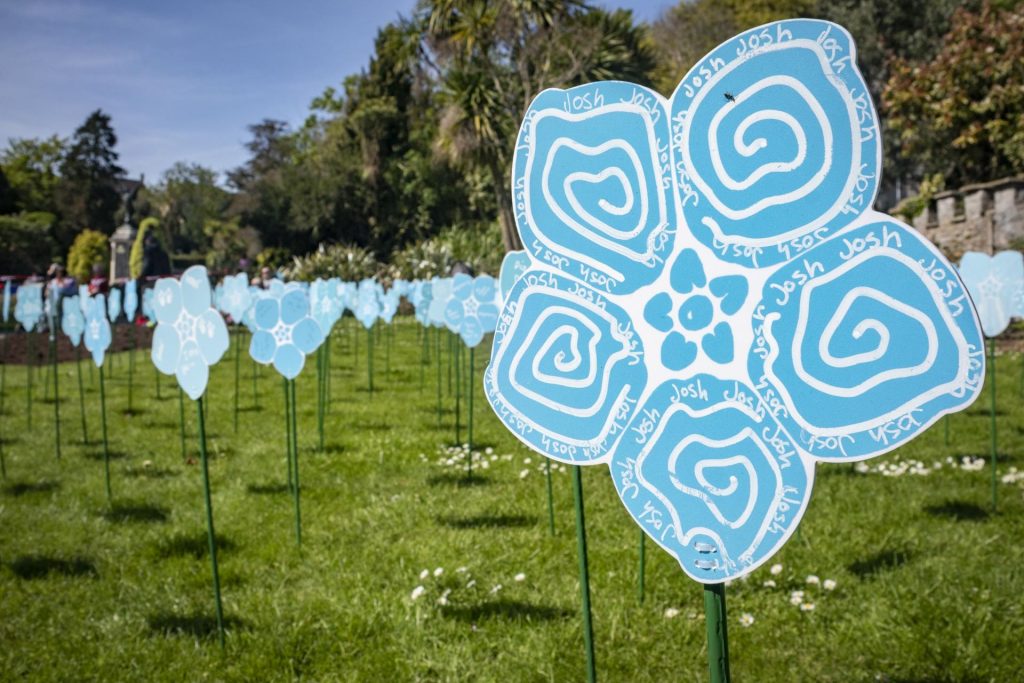
We bring to our hearts today all of those lost in the pandemic, our elderly and vulnerable, and those who still suffer through ongoing health issues connected to Covid, and all those who died as a result of the incredible pressure our beleaguered health service was put under.
We bring to our hearts all those who laboured so selflessly throughout it all, the doctors and nurses and hospital staff and carers who worked without regard for their own safety, who didn’t see their families properly for weeks, who risked their own lives day after day.
We hold in our hearts all those who had to shield, and continue to shield due to their Covid.
We have lost their company in our society. They have lost their freedom.
And we bring in our ancestors today, all those who lived and loved and grieved whose very existence gave us life. They stand around us today in spirit, all who went before. They are in us still.
Grief is love inside out.
Life is a precious gift. Existence is kissed from the lips of non existence.
This is the moment between the click and the bang.”
Good Grief Weston is funded by UKRI and AHRC and produced by Culture Weston and the University of Bristol as part of a collaborative project which aims to reduce inequity and tackle social isolation in end-of-life care and bereavement.
Photos by Peter Goodrum Photography, with thanks
Good Grief Weston!
1 May saw the launch of the festival with Grief Moves, a ‘grief rave’ by The Fandangoe Kid and Carly of The Loss Project. It was a beautifully sunny afternoon on the High Street and a warm community atmosphere, with lots of people coming by to request songs in memory of people they had lost – and plenty of dancing on the street!
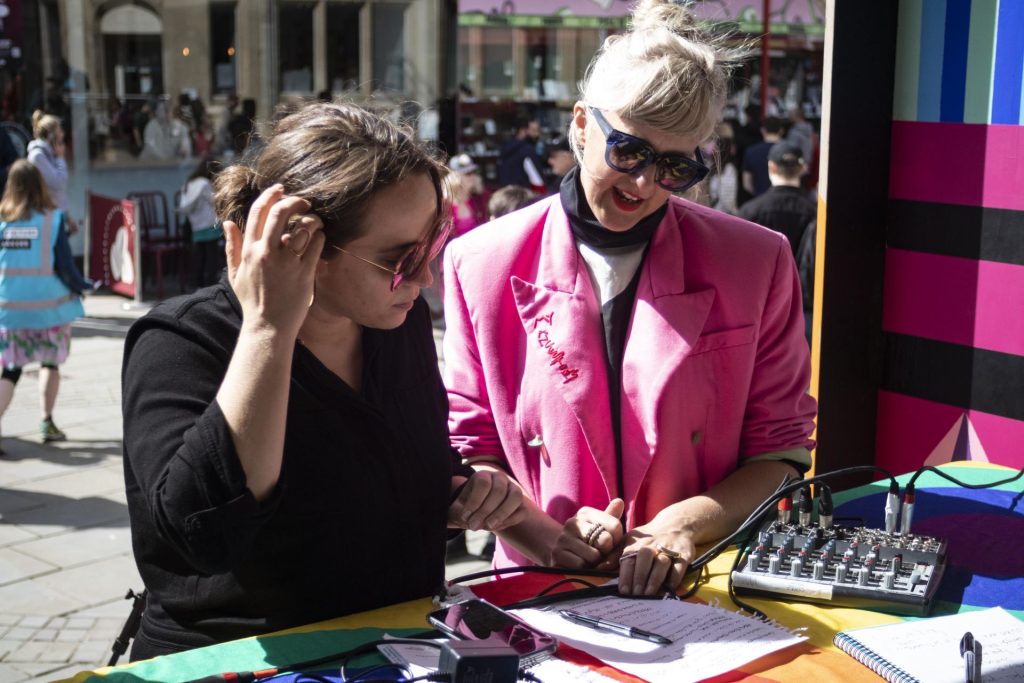
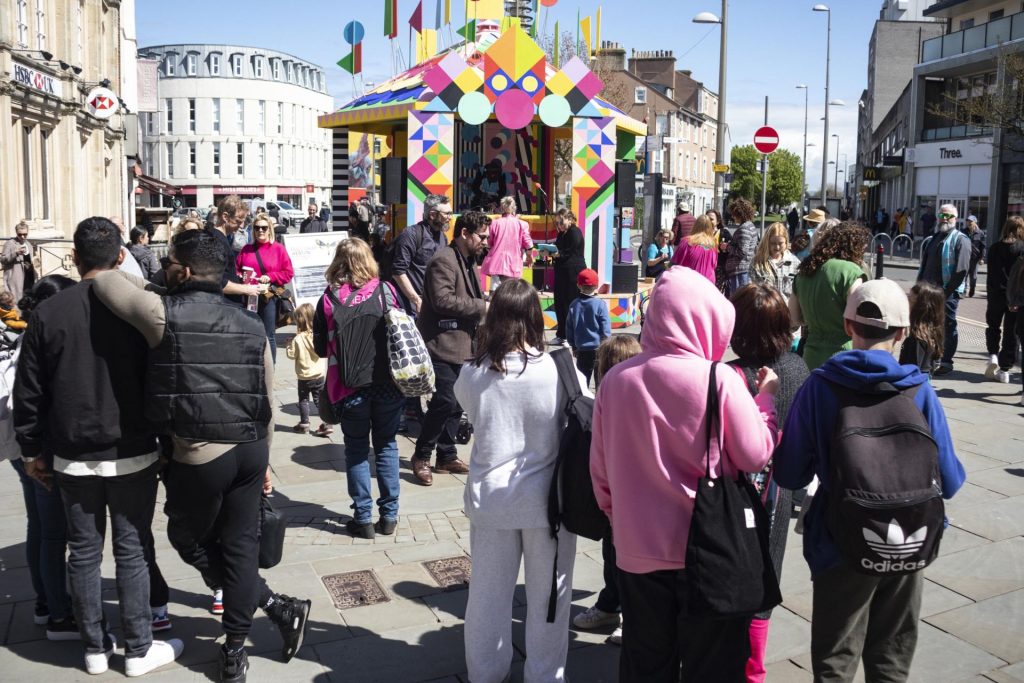
The festival runs until 8 May, with a host of events across the town and some in North Somerset. You can register here – all events are free or pay-what-you-decide. See you there!
Reflections on Grief Gathering Training
On 31 March, thirteen members of the Weston-super-Mare Community Network attended Grief Gathering Training, at The Community Hub, 7 Aller Parade, Weston-super-Mare. The training was delivered by Sam Butler, Co-Artistic Director of Fevered Sleep. Fevered Sleep have been hosting Grief Gatherings all over the UK since 2015.
Grief Gatherings are small, free informal discussion groups about grief and loss. Anyone can come along, whether or not they’ve experienced grief, and people who join a gathering can choose to talk or they can just listen. They’re a chance for people to come together to talk, learn and think about grief.
Training participants included social prescribers, community artists, arts and health practitioners, a celebrant, student and a yoga teacher. Below, three participants reflect on their experiences of the training.
“I’ve always been a firm believer in encouraging people to talk about grief, death and dying after so many people found it hard to talk to me following the death of my Dad in my twenties. It was really wonderful to attend this session which was facilitated by Sam from arts organisation Fevered Sleep, as this way of being was not only actively encouraged but beautifully held in a safe, nurturing space. The session was sad at times, but also (for me) celebratory and lovely. There is never any pressure to open up at a Grief Gathering and there definitely wasn’t at this session, but most people opened up in one way or another and were met with support and kindness from the other participants.
I was particularly taken with the pack of postcards featuring quotes from previous grief gatherings we were all given. It can be so hard to feel that the future will be bright again when you are deep in grieving territory. However, the postcard with “There will be joy again” written on reminded me that joy did come back for me, and that the more opportunities to talk, cry and celebrate we have the more those glimmers of hope make themselves seen.” – Karen Blake
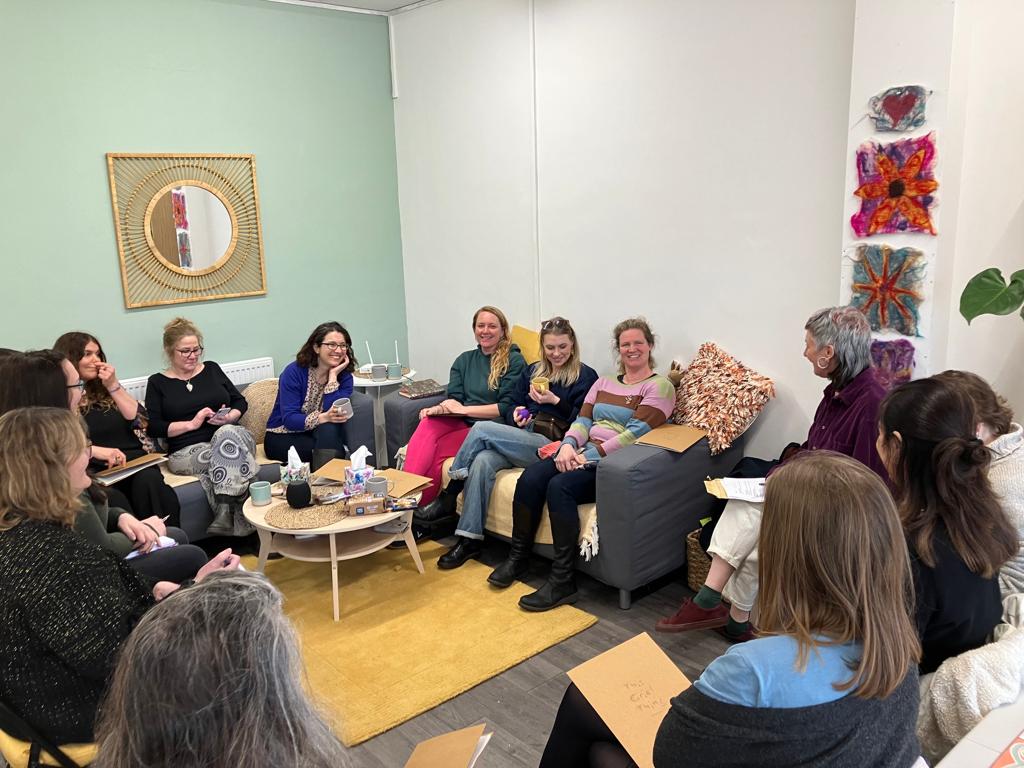
“I attended the Grief Gathering training with the idea of expanding my skills in holding safe spaces to talk about grief in a professional context. Having shifted towards working with older adults and increasingly in care home settings over the past few years from a previous specialism of working with children and young people, loss and grief had become a more prominent reality in the delivery of my work. I entered the space as a professional seeking to grow my practice in order to support others including colleagues, carers and group members, but actually found that the space encouraged me to look at my own grief and how it sits alongside my ability to hold these important conversations.
The training provided a unique opportunity to step away from my professional self and sit next to my grief in a room full of potential colleagues, partners and peers, none of whom I knew well. The session taught me to feel safe in this process and how to model this safety in holding that process for others. It simultaneously lowered my barriers and heightened my awareness of the grief all around me. I have thought of the provocations of the session every day since the training, I am not yet sure how I will be applying this new knowledge and skill but the ideas and potential are currently dancing in my head, hand-in-hand with my own freshly acknowledged grief.” – George Densley
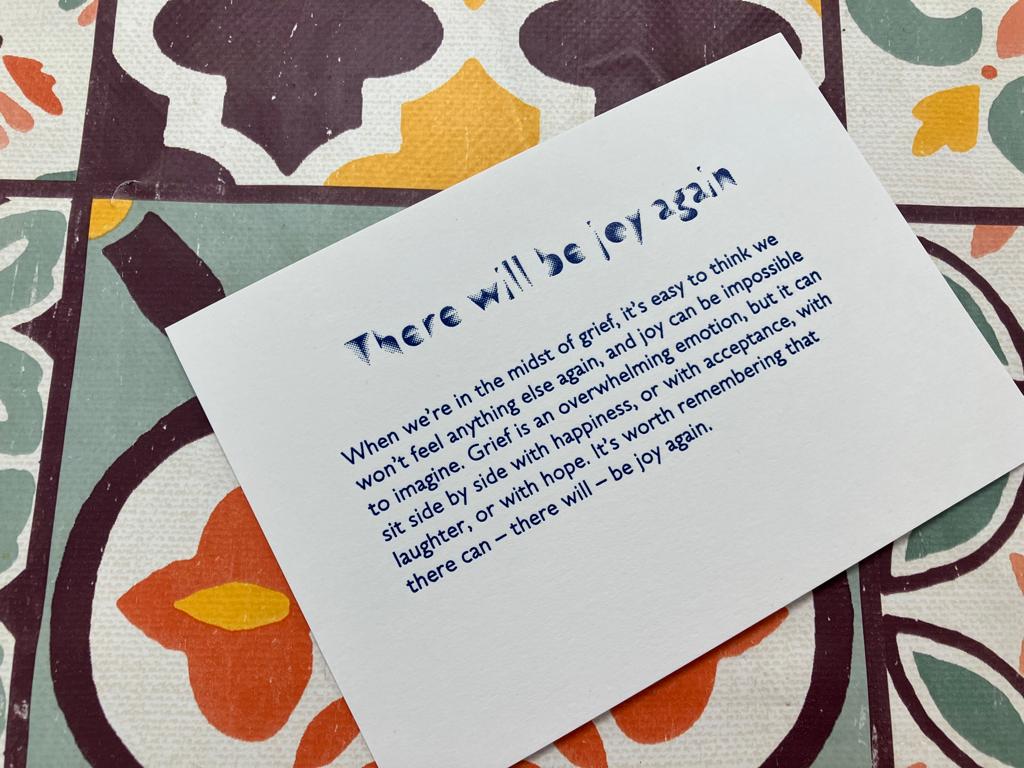
“The Grief Gathering training was an intense but ultimately very lovely day, shared with a group of really supportive and considerate people. One of the things that struck me most was how the day ended up being part training session, part actual Grief Gathering. I knew from the schedule that we would be having a 30-minute practice run of facilitating a group conversation about grief, but throughout the whole day there was a lot of space given to just talking: voicing our thoughts and experiences, going on tangents, talking about certain common grief phrases we do or don’t like (things like ‘they are in a better place now’ or ‘no longer with us’).
The lack of rigid structure, which is often a bad thing on longer training courses, felt right. I thought about how we are “trained” in life by going through things: by our experiences, and by talking to people, accruing a kind of perpetually changing emotional muscle memory. Sam said to us that the person facilitating Grief Gatherings is not an ‘expert’ there to offer professional advice, but that participants will often spontaneously offer guidance to each other. There is so much in grief that exists outside of and next to the (also extremely necessary) more professional forms of bereavement support.
Our conversations showed that everyone has a different time with grief, and that something one person finds comforting might absolutely be the wrong thing to say to someone else. The only way to find this out is by talking openly: by saying something even if it might be wrong, and by the other person being honest about how they feel in response. One of the other attendees summed this up perfectly, saying “it’s better to have an imperfect conversation than no conversation at all”.
Alongside this emphasis on being open and responsive, Sam gave us some really valuable guidance on how to properly facilitate a Grief Gathering. While this could be seen as a less organic aspect of the gatherings, it is a necessary one to ensure that the participants can engage with the conversation, be supported to share, and not feel completely jarred when the session ends and they have to return to the ‘real world’. We spoke about giving clear and gentle warnings about how much time is left, and small rituals – such as writing down one sentence about how you are feeling – to bring participants back to the present moment after the conversation. In our practice groups, having the facilitator guide the conversation seemed to make the experience smoother and, in a way, more natural, with someone mindfully opening up the space and then bringing it to a close.” – Gina Walter
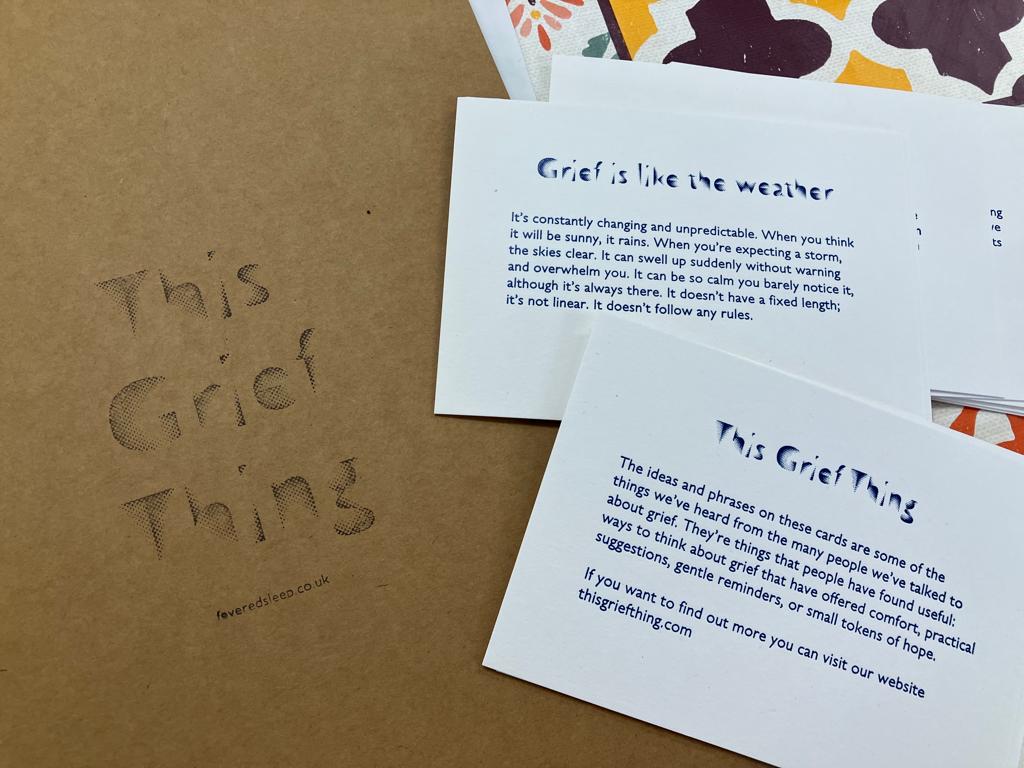
Good Grief Weston Launch! 23 March 2023

We are delighted to launch Good Grief Weston today, on the National Day of Reflection. This news piece tells you more about the festival and its highlights. Registration is now open on the Culture Weston website: https://cultureweston.org.uk/projects/good-grief-weston/
We hope there is something for everyone. Please spread the word!
Organisations and community groups in Weston and North Somerset are invited to get involved. A PowerPoint slide deck about the festival including details of how to have an event listed on the festival website is available for download here:
Second Community Meeting: 20 February 2023
After our successful first network meeting at The Campus in Weston-super-Mare last December, we held our second community network event at the same venue on 20 February. Over 35 stakeholders came together, representing multiple sectors, including three public contributors. At least half those attending were joining the network meeting for the first time.
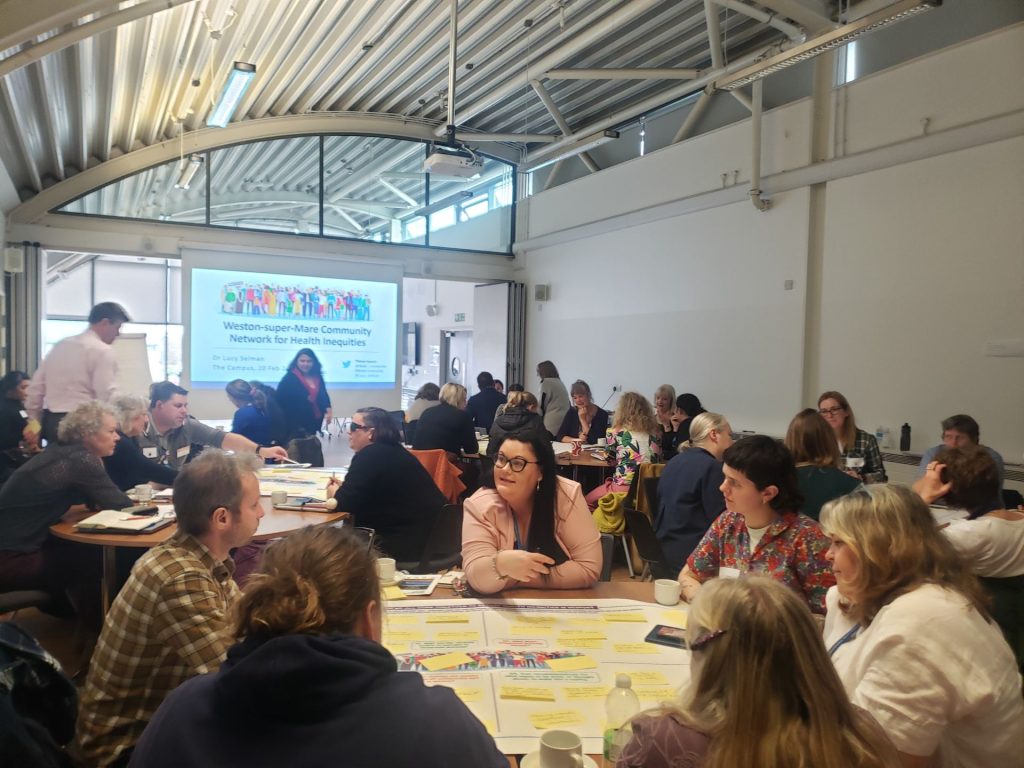
What happened
Everyone in the room introduced themselves to facilitate networking. Dr Lucy Selman, project lead, began with an overview and re-cap of the network project, including the upcoming launch of the Good Grief Weston festival, which will take place in venues across Weston-super-Mare and North Somerset from 1-8 May 2023. The festival draws on the approach of Good Grief Festival, founded by Dr Selman in 2020.
Events at Good Grief Weston will be co-designed by Culture Weston and members of the public. They will include creative workshops for people in recovery from drug and alcohol addiction, young people, and older men to facilitate discussion of grief and illness and raise awareness about local support. Participants at the meeting were warmly encouraged to get involved.
Lucy then reminded everyone of other planned outputs from the project including:
- a publicly accessible online regional directory of community assets in Weston and North Somerset relevant to serious illness, bereavement and social isolation and loneliness;
- a map of local, regional and national datasets relevant to end-of-life care and bereavement;
- a synthesis of Weston’s existing creativity evaluation data
- a model depicting how the ICS (Integrated Care System), community assets and the public can best work together to reduce health inequities.
Four workstreams and four ways you can get involved
The four leads for each workstream gave a five-minute update on their work:
Sue Stone (Voluntary Action North Somerset) updated on the community asset directory asking the question of whether google and twitter are safe forums for people recently bereaved to seek support and whether we need to develop a ‘Bereavement first aid kit’ for individuals and services.
- Get in touch with Sue [Sue.stone@vansmail.org.uk] if you are working with a community asset that is perhaps more informal and not yet an online presence, so Sue may not be aware of it. If she knows about what you do, she can include it in the directory.
Charlotte Chamberlain (University of Bristol) talked us through the data that is currently available and how it helps us to tell the story of what people experience in their last year of life or as a recently bereaved person in North Somerset. Charlotte also identified where the gaps in current data exist.
- Get in touch with Charlotte [Charlotte.chamberlain@bristol.ac.uk] if you work within the social care or healthcare sector and gather any data on the last year of life and or those recently bereaved.
Julia Fortier (Arts Health South West) described the different ways creative engagement projects have been evaluated, including the benefits to the community.
- Get in touch with Julia [research@ahsw.org.uk] if you run arts health events and gather any kind of monitoring, auditing, feedback or evaluation data afterwards.
Fiona Matthews and Angie Athay-Hunt from Culture Weston shared information about Good Grief Weston and described how people can get involved. The festival is all about building on the community assets of Weston – people, places and organisations.
- Get in touch with Fiona [fiona@cultureweston.org.uk] if you would like to run an event during the festival and have it listed on the festival webpage.
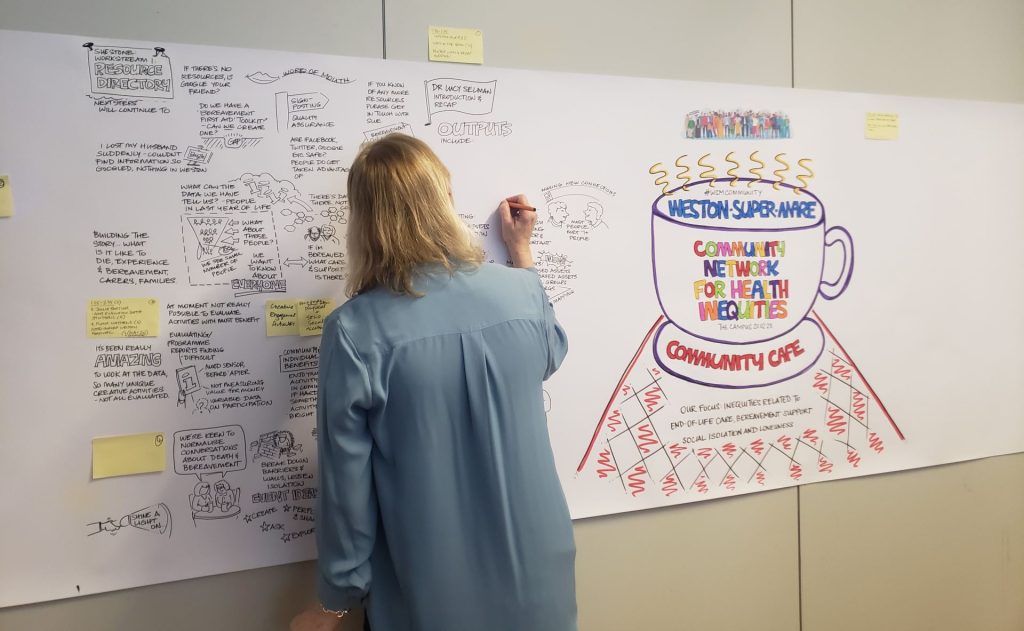
Small-group conversations
Fran O’Hara from Scarlet Designs, who did such a fantastic job of facilitating the discussion at our December meeting, introduced the small group discussions to explore how best we can work together as a network. Four questions were explored:
- What are the sticking points or barriers to integrated working?
- What helps integrated working happen?
- What changes are needed to help us all collaborate well?
- Thoughts and recommendations to make this a reality – what needs to change?
Fran created this wonderful summary of the discussion:
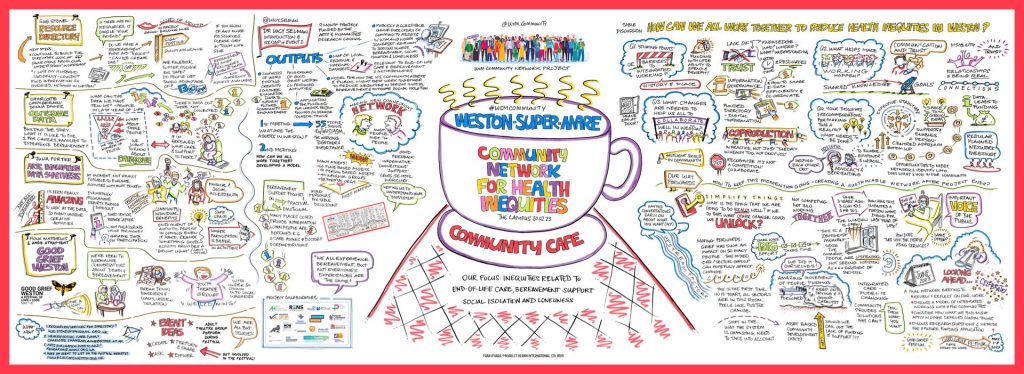
As this was our second network meeting we allowed more time for sharing and reflections and there was a very rich discussion.
Key themes were:
- The importance of providing access to support and information after loss
- The importance of local connections
- How what matters most varies depending on one’s culture
- Gaps in current data collection
- The need for a ‘Bereavement First aid’ tool kit
The next community network meeting is in June (date TBC), when we will review all the findings from the project and plan next steps. For more information about the network, please contact either Alice Malpass, a.malpass@bristol.ac.uk or Alison Bamford, alison.bamford@bristol.ac.uk.
‘No Barriers Here’ training day held in Weston
On Thursday 26th January 19 people from the Weston community network met with Gemma Allen and Jed Jerwood from the award-winning No Barriers Here team. We gathered for the workshop at the fantastic new community arts venue, The Front Room, on Dolphin square.
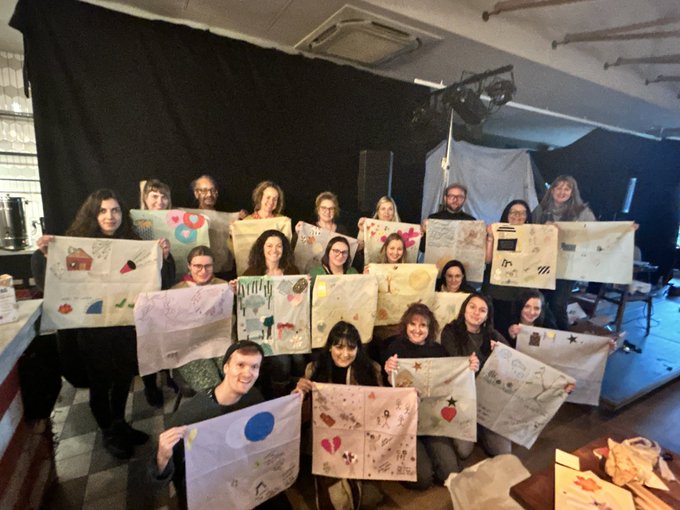
People attending came from a wide range of organisational and work settings: care homes, Weston hospice, University Hospitals Bristol and Weston, The Other Place community hub, Off The Record mental health charity, independent Weston artists and community development workers and Culture Weston.
What happened on the day?
Gemma and Jed guided us on how to facilitate conversations about serious illness, death and dying, grief and bereavement, advance care planning and ‘what matters most’ in life using arts-based methods.
We started the day with introductions before hearing from Gemma and Jed about how No Barriers Here had been developed and why it was structured as three consecutive workshops. They also shared some inspiring case studies of delivering the workshops successfully with various community groups – including adults with learning disabilities, traveller communities and refugees. All three groups may usually never be asked about their preferences for end-of-life care or have opportunities to talk about death, grief and dying.
We explored as a group the value of an arts-based approach by working through the three workshop activities, using the same packs that would be used when working with communities. This gave everyone experiential insight into the power and impact of the No Barriers Here approach.
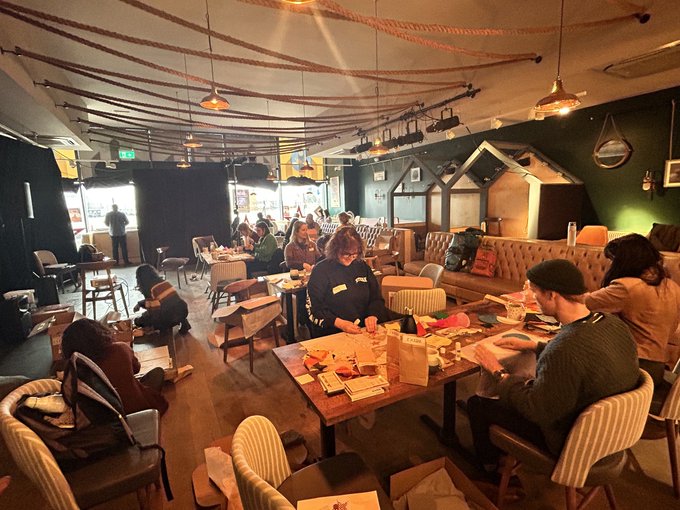
Everyone who attended the training left with a free resource pack to facilitate this work afterwards. Jen Wakefield from Weston Hospice has kindly offered to provide support as participants start to work with their communities on the topic of death, dying, serious illness and bereavement and grief.
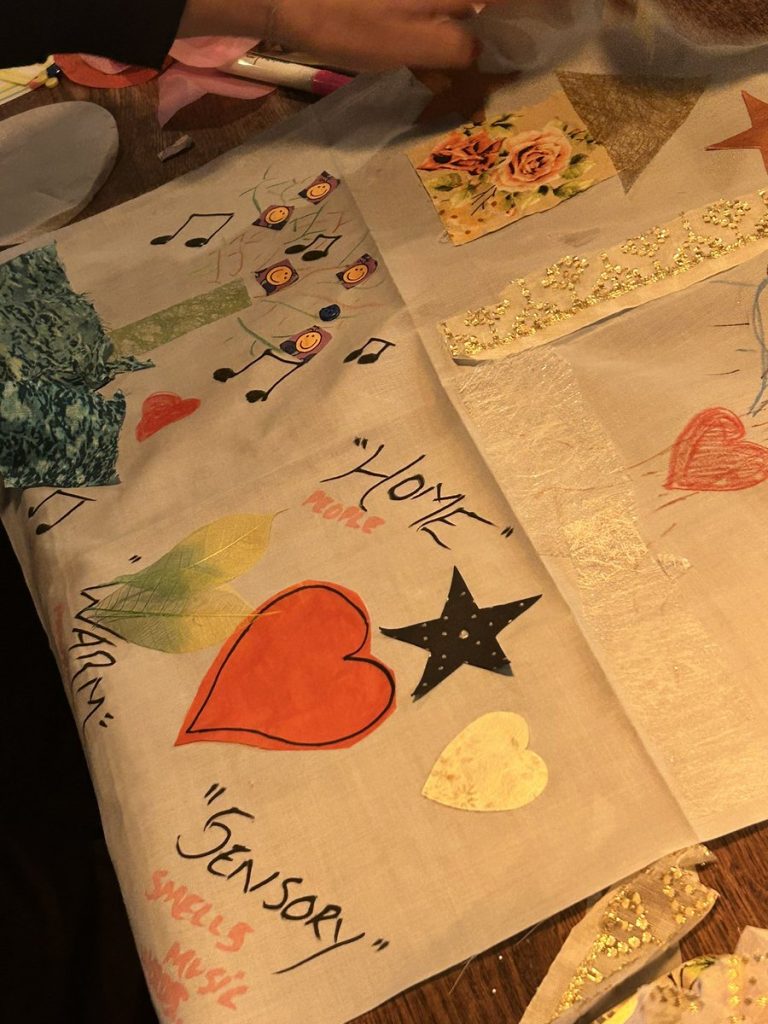
First Community Meeting: 7 December 2022
Our first community network event was held on December 7th at The Campus in Weston-Super-Mare. Around 55 people attended, representing multiple sectors with a shared interest in tackling inequities in end-of-life care and bereavement: community development workers and community artists, voluntary and community sectors organisations such as Culture Weston, Race Equality North Somerset and Voluntary Action North Somerset, the social care and care home sector, University Hospitals Bristol and Weston NHS Foundation Trust, primary care, Weston Hospice, North Somerset council, academics and of course, members of the public.
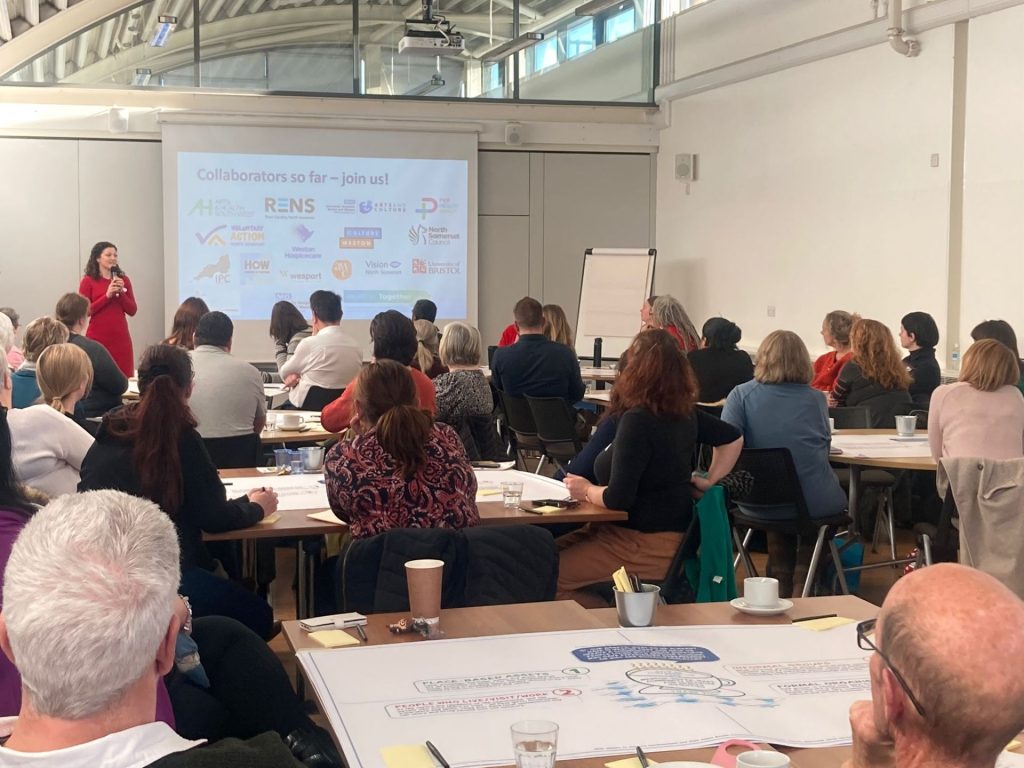
After an overview of this AHRC-funded project by Dr Selman, attendees heard about the fantastic work of local Weston champions John Bailey (Weston Hospice), Helen Wheelock (Alliance Homes, Create Together CIC), Bev G Star (Humans of Weston CIC) and Alison Bancroft (Race Equality North Somerset, The Other Place). Seated on 8 round tables, we all discussed the community assets in Weston-super-Mare before hearing from two more inspirational community champions from further afield about their work: Ian Leech (formerly Community Development Lead at St Giles Hospice in Litchfield) and Jan Perry (former community development worker and founder of the STAR bereavement support model).
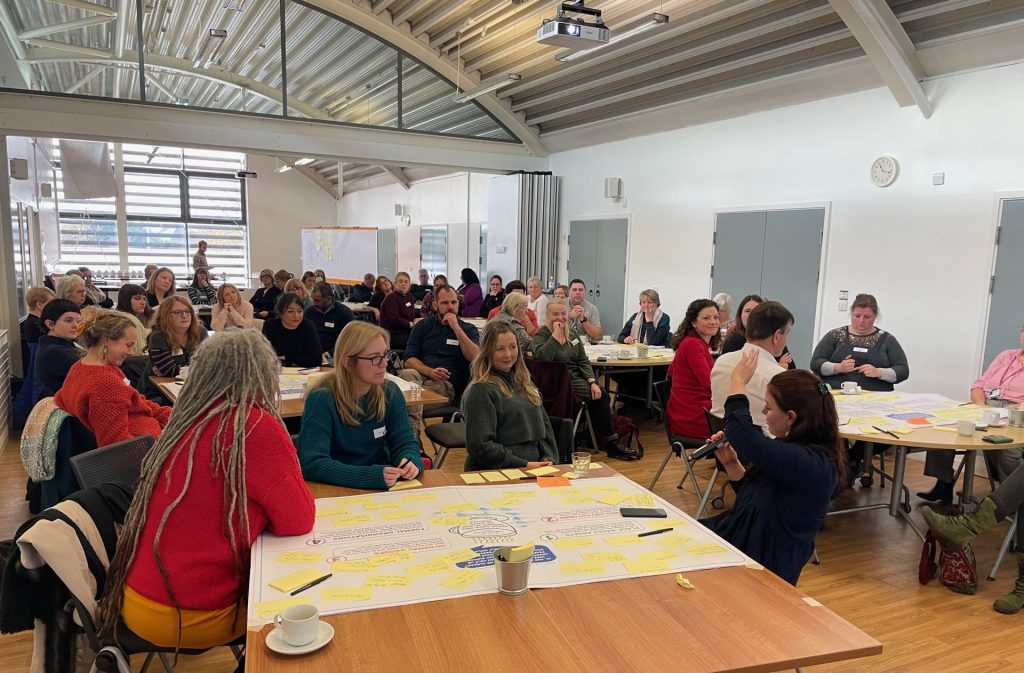
We ended the meeting brainstorming in small groups how to help 8 different fictional people, each with a unique set of circumstances that put them at risk of loneliness and facing obstacles to accessing support.
The day was facilitated by Fran O’Hara from Scarlet Designs, who created all the table sheets we annotated and this fantastic visual summary of the event!
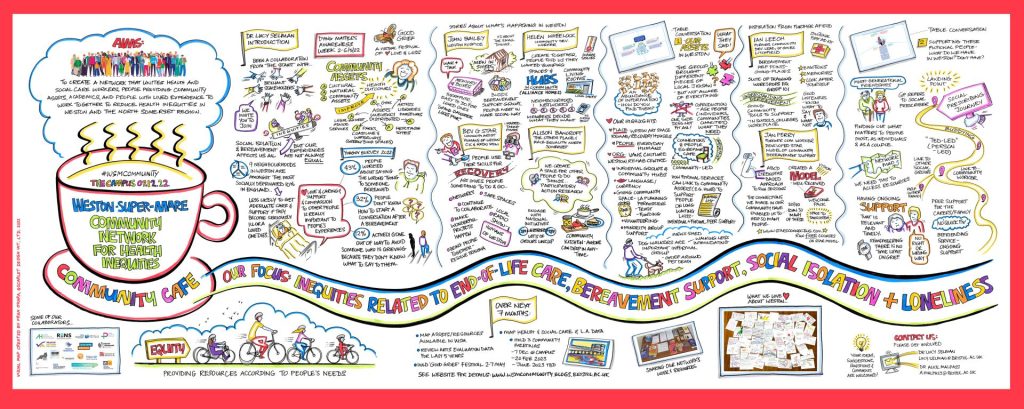
Download the image here.
The community network is next meeting on Monday 20th February at The Campus, starting with lunch at 1pm. At the February meeting we will explore how we can work better together. Registration is now open – please sign up here. For more information about the network, please contact either Alice Malpass, a.malpass@bristol.ac.uk or Alison Bamford alison.bamford@bristol.ac.uk.
Please check back for more study updates and reports.
